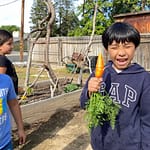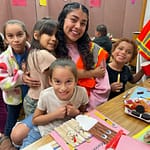Every Neighborhood Partnership is partnering with the Luis Palau National group to create a six-month series that describes our work in the city. Below is the second post in the series from the Director of Neighborhood Development, German Quinonez.
Theology of Place: ENP’s Neighborhood Development Work
Last month Artie Padilla set a platform on our work in Fresno and how we use the Church as an anchoring lever for all the work we are actively engaged in. This month we zero in on the work that is happening in our neighborhoods through Theology of Place.
We will first look our methodology, then we will share some practical examples of how this plays out.
As Simple as ABCD
This Grass roots theology adopts a place-based methodology to engage disadvantaged communities in a new and rich way.
This framework considers the spatial (geographical dynamics) of under-resourced neighborhoods. It then examines how the proximity of human relations co-exist within those spatial boundaries. Think Geography for a moment in the life of Jesus. An effective method of Jesus was preaching and ministering the gospel in densely populated areas such as Galilee, Jerusalem, Samaria, and other smaller provinces where people gathered to eat, work, and live. This model for kingdom building centers on two things. Being relational and ministering in proximity.
Theology of place also adopts principles found in Asset Based Community Development (ABCD) as a strategy for sustainable community. ABCD is a theory of social change. It is premised on the idea that effective community development begins and ends with the assets and strengths that already exist in a particular community. In this real sense, the Church is an asset or gift to the community. Any seasoned bible student knows the rigorous and rewarding work from exegeteing the scriptures which requires the use of many tools to examine and draw out the context to discover the meaning of a passage. In the same manner, the faith community can learn to exegete the city using various tools.
Utilizing an asset-based approach, churches can become experts of their own community by developing strategies to identify the felt needs of a community while providing a pastoral posture towards that community. It is essential for churches to recapture the idea of local mission if they want to see real community transformation. To engage in this process is to develop a renewed understanding of the importance of place from a theological perspective.
Next we will move from the theoretical to the practical. The following are some examples we have used in our neighborhood work. During this past Spring break we helped to mobilize 1,515 volunteers throughout the Valley to participate in 125 different projects for our Serve Fresno week. In addition to those clean-up and beautification projects we also provided ongoing serving opportunities to host block parties and community gatherings. Additionally, we recently developed a neighborhood fitness program with local parents and residents to combat obesity and poor access to healthcare. Our resident-leaders will facilitate various fitness exercises in different neighborhoods.
For more in-depth neighborhood engagement, we helped create strategies that led to self-sustainability, empowerment, and leadership development. Intentional place-based conversations with key people in that community achieved this. This is a crucial step in the process because discovering what people care about the most is the key. Ministry initiatives then emerged from the felt needs of that community. Often times, ministries with great intention do more harm than good. They implement missional strategies that focus solely on a community’s weakness without first considering its strengths and assets. Developing a place-based initiative moves the church into the next phase of in-depth relational engagement and thus into an incarnate way of living like Jesus in the flesh.
Theological Basis for Community Transformation
- Reaching your community-Jeremiah 29:7
“Seek the peace/shalom of the city to which I have sent you and Pray to the Lord in its behalf, for in its shalom, you will find shalom.”
- Loving your Community-Mark 12:30-31
“Love your neighbor (neighborhood) as yourself.”
- Serving your Community-Matthew 25:31-40
“whatever you did for one of the least of these, you did for me.”
- Listening to the Community-John 4:27
“Just then his disciples returned and were surprised to find him talking with a woman from Samaria.”
- Building on assets of the Community-Mark 6:35-44
“How many loaves do you have?” he asked. “Go and see.” When they found out, they said, “Five loaves—and two fish.”






Leave a Reply